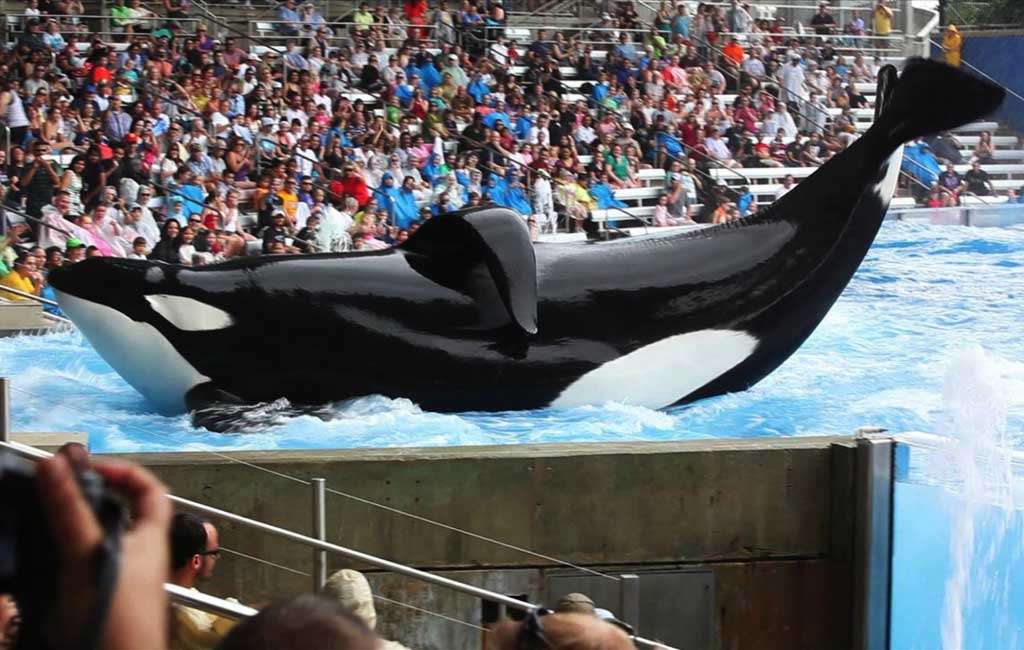Cruelty of the aquarium exposed in killer whale documentary 'Blackfish'

Campaigners against keeping killer whales in captivity hope a documentary released in cinemas today will both shut down an industry and go on to win an Oscar.
Blackfish tells the story of Tilikum, a 12,000lb performing bull orca at SeaWorld in Florida that has killed three people including his trainer during a show at the Orlando resort in 2010.
Having initially ignored the documentary when it premiered at the Sundance film festival earlier this year, SeaWorld went on the offensive last week following the nationwide US release and denied claims made in the film that their policy of keeping Tilikum in captivity led to the deaths.
The bull orca was captured off the coast of Iceland in 1983 and moved to SeaWorld in 1992 shortly after his involvement in the death of trainer Keltie Byrne at Sealand of the Pacific. That resort soon closed. In 1999, 27-year-old Daniel Dukes was found dead and nude, draped over Tilikum’s back. He had stayed until SeaWorld closed for the evening, evaded security and managed to get into the tank.
Dawn Brancheau’s death, witnessed by dozens who had paid to see the 40-year-old trainer’s show, inspired director Gabriela Cowperthwaite to investigate the effect captivity has on orcas. Her film has led SeaWorld to defend its practice of keeping performing killer whales, or blackfish as they are less commonly known.
SeaWorld first claimed the 40-year-old trainer had slipped and fallen, later changing its mind to say Tilikum must have thought Brancheau’s ponytail was a fish or a toy, which caused her to be dragged to the bottom of the tank.
SeaWorld said in a statement: “Tilikum did not attack Dawn. All evidence indicates that Tilikum became interested in the novelty of Dawn’s ponytail in his environment and, as a result, he grabbed it and pulled her into the water.”
An ex-SeaWorld trainer interviewed for the documentary said he was disappointed the resort maintained that Ms Brancheau had got too close to Tilikum.
Ms Cowperthwaite, who has made documentaries for National Geographic and Discovery, said it took her two years to complete the film, in which time Tilikum returned to performing.
“There is no documented case of a killer whale ever killing anybody in the wild. It’s only in captivity where these incidents have happened,” said Ms Cowperthwaite. “It’s time for this experiment to end.”
SeaWorld, which has marine parks in Orlando, Florida, San Diego, California and San Antonio, Texas, has hit back labelling the film “inaccurate and misleading”.
The company said: “Blackfish is billed as a documentary, but instead of a fair and balanced treatment of a complex subject, the film is inaccurate and misleading and, regrettably, exploits a tragedy that remains a source of deep pain for Dawn Brancheau’s family, friends and colleagues.”
It said the film paints a “distorted picture” and does not describe SeaWorld’s work of rescuing, rehabilitating and returning to the wild “hundreds of animals each year”.
SeaWorld added: “Perhaps most important, the film fails to mention SeaWorld’s commitment to the safety of its team members and guests and to the care and welfare of its animals, as demonstrated by the company's continual refinement and improvement to its killer whale facilities, equipment and procedures both before and after the death of Dawn Brancheau.”
Following Ms Brancheau’s death, trainers are no longer allowed in the tank with the killer whales where a typical manoeuvre saw them lifted high into the air on the nose of the orca. Campaigners now want to see an end to the performing industry altogether.
Will Travers, CEO of the Born Free Foundation, said: “Blackfish is a damning indictment of the commercial exploitation of magnificent wild creatures and I challenge any reasonable person who sees this film, listens to the testimony of former trainers and hears the evidence for themselves not to come to the same conclusion. It’s over. Blackfish will create such momentum for change that it will prove unstoppable.”
Blackfish is tipped to follow the success of The Cove, a film about dolphin hunting in Japan that won the Academy Award for best documentary in 2010.
Greenpeace points out killer whales do not have to end their lives in captivity. Springer, the only orca known to have been put back into the wild after she was found orphaned in 2002, was spotted last month with her first baby.
Finding Springer with her baby is “the ultimate sign that this whole reintroduction was a success. It was very exciting,” said Graeme Ellis, a research technician with Fisheries and Oceans Canada’s Pacific Biological Station.
Join our commenting forum
Join thought-provoking conversations, follow other Independent readers and see their replies
Comments
Bookmark popover
Removed from bookmarks